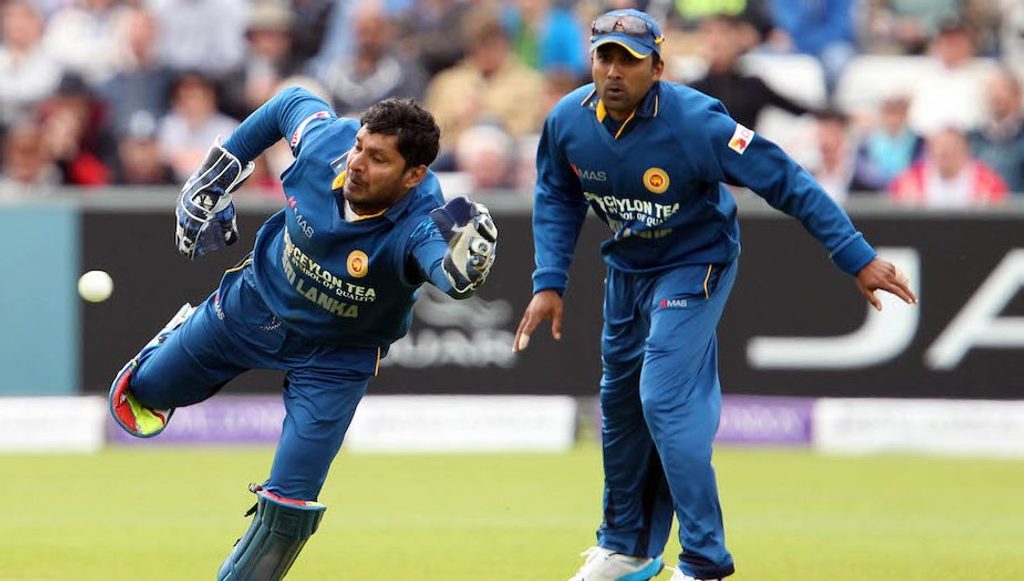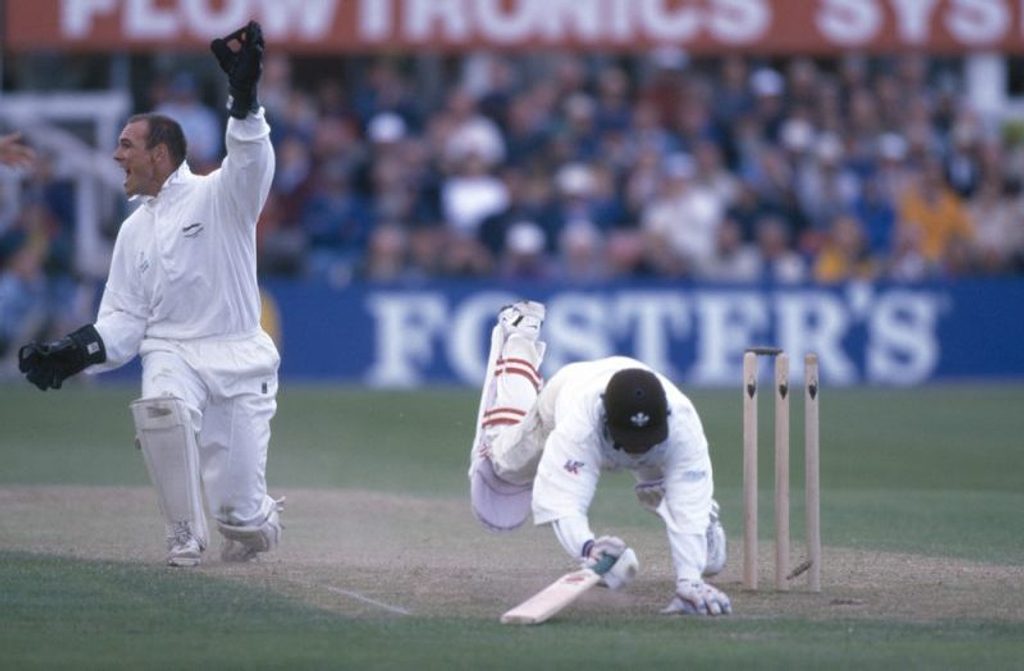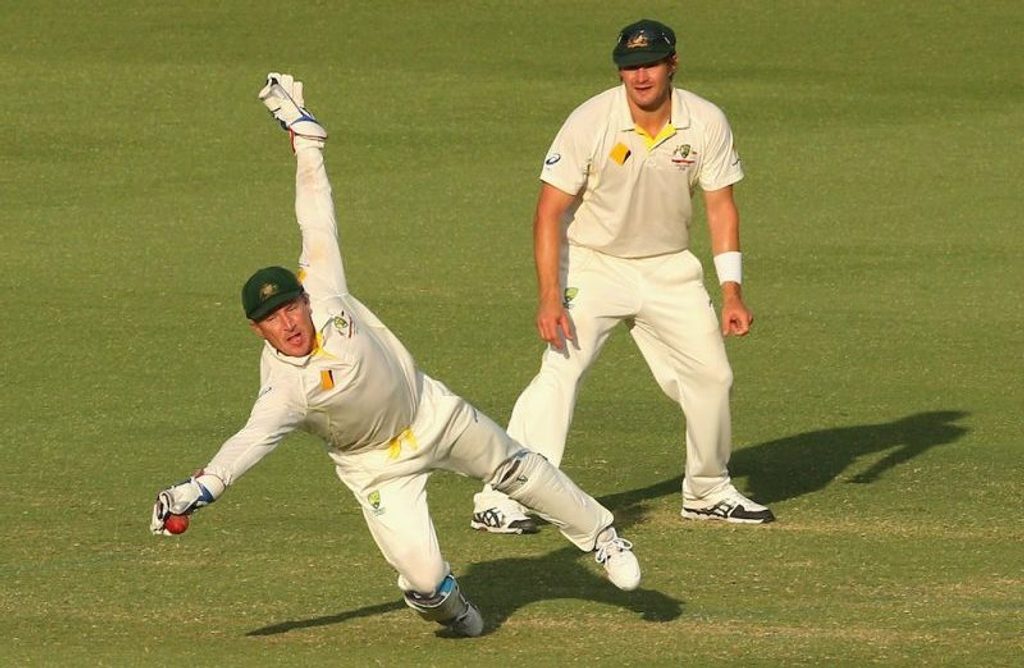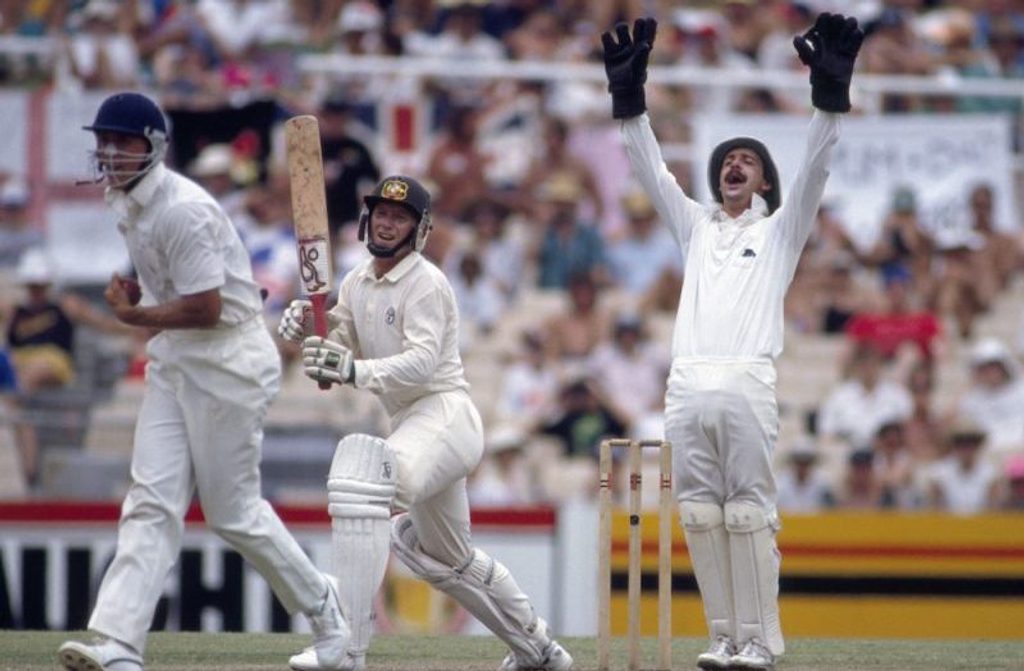
This article appears in the Winter 2019 issue of The Nightwatchman. Available in print and digital editions.
The Nightwatchman is Wisden’s quarterly. Combining brilliant writing and beautiful design, it is the perfect gift for cricket fans this Christmas. Take a look at our Christmas gift options. Get 10% off NW28 with the coupon code WIS28 at the checkout.
I play cricket with William Fiennes. He is a brilliant wicketkeeper, a model of unfussy class in a team of enthusiastic amateurs. I’ve read his books too – beautiful, lyrical, thoughtful – and so when worlds collided and he sent in a piece about wicketkeeping, I was delighted, greedily lapping up every word. It is a wonderful piece; every word is carefully selected, perfectly balanced and some of the phrasing makes you catch your breath and want to share the joy with other people who love the game like you do…
Matt Thacker, managing editor of The Nightwatchman, Winter 2019
***
In the Winter 2019 issue of The Nightwatchman, William Fiennes pays tribute to the art of wicketkeeping.
My father had been a wicketkeeper, widely admired, playing at Lord’s aged 18 in the summer of 1939, maybe good enough for a county trial if war hadn’t barged in, and it was still in his bone and muscle memory in his eighties and nineties, throwing an apple up and catching it and nudging the bails off, or just miming a take to one side of the body, his fingers and palms opening into a bowl or cradle, a little give with the elbows as the ball invisibly landed, not “caught” so much as greeted and received, the evidence there when he held his hands up and you could see the fingers all crooked where balls had crocked the joints, corroborated too when old friends of his encountered with Rover tickets in the Warner or Allen stands would look down at me and remember not just my father’s batting but his keeping too: “A very good wicketkeeper, your father…”
So when at school they asked for a volunteer, I raised my hand. The gloves in the communal kitbags were huge, cumbersome gauntlets, sweat-soaked leather hardened in the off-season, the plastic finger guards like burly thimbles, the pimpled catching surface worn smooth and shiny. The chamois inner gloves were hard and creased when you first put them on but would melt and soften with sweat from your hands so that after a short sequence of catches the paraphernalia of inner and outer gloves seemed to meld with your own body and be forgotten.
I don’t remember any coaching, it was more a matter of imitation, mimicking the squats and nimble sidestep dances of Bob Taylor and Jeff Dujon, relishing not just their diving one-handed catches but the lovely soundless grace of the task done right, understanding from Dad that the point was to go beneath notice, taking each catch so cleanly the ball made no sound in the gloves, the good wicketkeeper dissolving into each passage of play with Zen-like self-effacement.
 “The weight of the country, chaps! Forty-two million supporters right here!”
“The weight of the country, chaps! Forty-two million supporters right here!”
That was my father’s ideal, increasingly remote in an era when keepers were expected to lead the psychological attack, being right under the batsman’s nose and eyes, mouth in his ears, lips almost brushing the stump mic, expected to chirp and heckle like Healy, Boucher, Prior, Nixon, Wade, even the ineffably dignified Kumar Sangakkara haranguing Shaun Pollock with some entry-level psy-ops in the 2003 World Cup: “Lots of pressure for the skipper now, yeah? Gonna let his whole country down if he fails! Oh man, the weight of all these expectations, fellas! The weight of the country, chaps! Forty-two million supporters right here!”
And not just the relentless dreary chiselling at the batsman’s sporting and sexual self-esteem – now the keeper had to be chief of geeing-up and morale-boosting too, as if he were the afternoon’s host and compère, calling everyone “buddy” and filling the pauses – “Good areas, Frankie!” – like a radio DJ scared of dead air. Of course no one’s better placed to jab the needle, but even Paul Nixon must have felt something more complicated than enmity for the batsman standing just across the line.
You’re so close to the batsman’s talents and shortcomings it’s hard not to feel solidarity as well as opposition, so that the celebrations of a stumping might simply be a way of disguising the feeling you’d betrayed a friend. You can hear them breathing, hear the mantras of concentration and self-reproach they murmur to themselves, read forearm tattoos and bat labels, see where they take guard and how they mark it, how their feet settle and shuffle.
 “Even Paul Nixon must have felt something more complicated than enmity for the batsman standing just across the line”
“Even Paul Nixon must have felt something more complicated than enmity for the batsman standing just across the line”
When the ball approaches, keeper and batsman are alone together inside a world of movement and sound – the flurry of backlift and batswing, the faint creaking of leather boots and pads, the fabric swish and rustle, the expulsions of breath, the bat-and-ball percussion all bursting out of the still, silent moment when you and the batsman waited together in squat and stance.
Baseball has a catcher, cricket has a keeper: you keep wicket, like a diary or a secret, the verb rich with suggestions of ownership and intimacy. The keeper standing up to slow or medium-paced bowling is eye-level with the bails’ rolled beads and spigots, breathes woody stump varnish, knows each agricultural miniscape of grooving and abrasion made by bat toes and dragged studs across the batting crease – the guards, guidelines and small August dust bowls.
The idea was to stay low and rise with the ball, weight in the balls of your feet, thigh muscles driving out of the squat to spring to left or right. I liked the athletic possibilities of standing back to quick bowlers – at university I took one off the inside edge, a fast Neil Coulson out-swinger that first had me moving slipwards before a drive scrambled the trajectories and I dived full-length down the leg side, the ball landing snug in my left glove, just off the ground.
 Brad Haddin dives to his right during the third Ashes Test between Australia and England in 2013
Brad Haddin dives to his right during the third Ashes Test between Australia and England in 2013
And how about that flier off the outside edge at Burleigh Park, right-handed, slips dispersed to boundaries for a batsman on 99, or that guy trying to cut a wide one at Stonor so I was already moving in front of first slip and could plunge in front of second to land it one-handed inches off the grass… Now approaching 50, I’m aware of those reflexes waning, balls diverted off the edge already yards past me before my nerves convey the message of a chance, and sometimes I watch the YouTube clips – Tim Ludeman’s full-stretch zero-gravity left-hander, a Brad Haddin screamer in front of first slip, where in slo-mo you can see Shane Watson raising his hands in awe or prayer at the flying man under his eyes – and dream of just one more before it’s over.
Aged 12 I got Gordon’s Gin’s Wicketkeepers of the World by Godfrey Evans for Christmas, and the author’s Dickensian white muttonchops and ritual siesta in the lunch interval seemed part of a strain of eccentricity running through English keepers, via Alan Knott who warmed his hands in hot water before taking the field and reinforced his chamois inners with strips of plasticine, and Jack Russell who drove between games wearing a specially-adapted sleeping bag to keep his back and legs warm, and reportedly used the same tea bag through all five days of an Oval Test against Australia, which Derek Randall estimated amounted to a hundred cups. Dad liked Russell especially for his “tidiness”, and I’d absorbed the idea that this was the highest accolade available for keepers, whose mistakes – a drop, a bye, a fumbled stumping chance – could loom so unfairly over hours of quiet, unnoticed competence.
This was the goalkeeper’s burden too, and both keepers shared that Wim Wenders existential loneliness, the only one of their kind: a handful of batters, a handful of bowlers, only one keeper. And added to this was the way the game continually circulated the ball (and so also the focus of players and spectators) through the keeper like blood through the heart, not just when batters played and missed or let it go, but almost every time fielders gathered and sent it back in, as if the keeper were really the ball’s home, the place to which it always returned.
My Godfrey Evans book featured Jeff Dujon – who could go a whole innings without standing up to the stumps, at home midway between wicket and boundary while Marshall, Holding, Garner and Croft took turns stretching him like a goalie to posts, top corners and crossbar – and Farokh Engineer, who could go a whole day anchored to the stumps by the spin quartet of Bedi, Prasanna, Chandrasekhar and Venkataraghavan. Hard to imagine a book like that now, in the post-Gilchrist era, when keepers earn their place as much for their batting as their glovework, and when keeping is more an interchangeable athletic discipline than an art for which you might have natural gift and style.
Admirable sportsmen, of course, but who’s talking about “art” or “style” in the keeping of Ramdin, Karthik, Pant, Watling, Bairstow, Wade, Paine? The speed of Dhoni’s hands in a stumping off Harbhajan is objectively astonishing, but there’s a stiff, machine efficiency to the transaction that leaves me cold. Give me Sarah Taylor standing up to Nat Sciver or Anya Shrubsole, moving to leg as Ellyse Perry or Trisha Chetty or Suné Luus shape for a glance or flick but get nothing on it. Taylor has spoken of “flowing with the line” and it’s true there’s something silky or liquid in the way her hands and body track the angle to make the catch then spirit the ball back as if through her own slipstream to the bails, batter teetering off-balance, Taylor already rushing towards teammates with arms fully outstretched, beaming.
Standing back, each ball had the glory-potential of a one-handed grab; up close, I could only dream of leg-side stumpings like Taylor’s. Maybe you have to have kept wicket yourself to grasp the challenge: you’re in a squat outside off, and when the bowler sends it down leg it’s not just that you have a fraction of a second to adjust position, body following the advance party of your hands, but for a large fraction of that fraction the ball will be completely invisible behind the batsman, on the dark side of the moon, your hands moving blind, by dead reckoning.
So it’s not just an exhibition of physical speed and balance, but a computational miracle that Taylor can “know” where and when the ball will arrive and be there to meet it. Sciver couldn’t have been bowling more than 70mph, so think about Jack Russell in early January 1991, the third Test against Australia at Sydney, when Dean Jones on 60 has been batting out of his crease, so Russell is standing up (no helmet!) to Gladstone Small to keep the batsman honest.
 Jack Russell appeals during the third Ashes Test at the SCG in 1991
Jack Russell appeals during the third Ashes Test at the SCG in 1991
Small fires it at 80-odd clicks down leg, Jones tries to glance but misses, and in blink-speed Russell has followed his hands blind a couple of yards to his left and the bails are gone, Jones already walking. No way Jack Russell ran out that morning wondering how he was going to “get in the batsman’s head”. And Russell was dropped for the next Test, replaced by Alec Stewart, the superior batsman…
“Well taken”: I must have learned the phrase from my father, and that verb had resonance too – not “caught” but “taken”, as if each ball were a criticism or compliment the keeper had to absorb and process. It was more than catching. You made your broad, webbed hands into a berth or nest, and gave with the elbows to cushion the landing. The technique evolved to protect the palms from repeated heavy impacts – the ball a meat hammer tenderising the fillets – but origin stories didn’t matter when you saw or made those cradle shapes in the arms and the ball sank home so naturally you barely felt it. I don’t remember when I last really talked about wicketkeeping with my father.
Maybe it was around the time Russell faded from view, and Adam Gilchrist’s phenomenal impact as a batsman forced everyone to think differently about the keeper’s role – who cares about “flowing with the line” when you can score an Ashes century off 57 balls? But the conversation was still there when he lobbed an apple in the kitchen and made the stumping (Mum said he did the same when she threw him a pair of balled-up socks to put in his sock drawer) or held up his hands in silhouette with the window behind them, his fingers crooked like an old oak’s staghead branches, and in those dreamy bye-less afternoons when each catch landed true, all the half-volley throws, wides and leg-side surprises, Dad’s voice among my teammates’ saying: “Well taken, Will. Well taken.”







